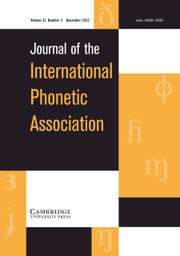Article contents
Bulgarian Speech Rhythm: Stress-Timed or Syllable-Timed?
Published online by Cambridge University Press: 06 February 2009
Abstract
Experimental work on Bulgarian speech rhythm has failed to determine which of the two “traditional” rhythmic categories the language belongs to. Using the model put forward by Dauer (1987), the present paper attempts to characterise the rhythm of Bulgarian in scalar rather than in dichotomous terms. For such an assessment, six of the components proposed by Dauer are relevant. Bulgarian is assigned two pluses (for intonation and function of accent), two zeros (for vowel duration and vowel quality) and two minuses (for syllable structure and consonant quality). According to the model, the more pluses a language has, the more likely it is that this language is “stress-timed”. From the relative rhythm “score” obtained for Bulgarian one can predict that, on a scale of rhythm, the language will occupy an intermediate position. This accounts for the contradictory conclusions reached in earlier studies. Dauer's model thus provides a useful starting point for a study of the rhythm of a given language, but it can be further improved, for example by adding zero marks for some of the components.
- Type
- Articles
- Information
- Copyright
- Copyright © Journal of the International Phonetic Association 1997
References
- 9
- Cited by


